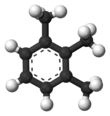1,2,3-Trimethylbenzene
1,2,3-Trimethylbenzene is an organic compound with the chemical formula C6H3(CH3)3. Classified as an aromatic hydrocarbon, it is a flammable colorless liquid. It is nearly insoluble in water but soluble in organic solvents. It occurs naturally in coal tar and petroleum. It is one of the three isomers of trimethylbenzene. It is used in jet fuel, mixed with other hydrocarbons, to prevent the formation of solid particles which might damage the engine.
| |||
| Names | |||
|---|---|---|---|
| IUPAC name
1,2,3-Trimethylbenzene | |||
| Other names
Hemellitol; Hemimellitol, Hemimelithol; Hemimellitine; Hemimellitene | |||
| Identifiers | |||
3D model (JSmol) |
|||
| ChEBI | |||
| ChemSpider | |||
| ECHA InfoCard | 100.007.633 | ||
PubChem CID |
|||
| RTECS number |
| ||
| UNII | |||
CompTox Dashboard (EPA) |
|||
| |||
| |||
| Properties | |||
| C9H12 | |||
| Molar mass | 120.195 g·mol−1 | ||
| Appearance | Colorless liquid[1] | ||
| Density | 0.89 g/mL[1] | ||
| Melting point | −25 °C (−13 °F; 248 K)[1] | ||
| Boiling point | 176 °C (349 °F; 449 K)[1] | ||
| 0.006% (20°C)[2] | |||
| Vapor pressure | 1 mmHg (16.7°C)[2] | ||
| Hazards | |||
| Main hazards | Flammable[3] | ||
| R-phrases (outdated) | R10 R37 | ||
| S-phrases (outdated) | S16 | ||
| Flash point | 11 °C; 51 °F; 284 K[1] | ||
| 243 °C; 470 °F; 516 K[1] | |||
| Explosive limits | 0.8%-6.6%[2] | ||
| NIOSH (US health exposure limits): | |||
PEL (Permissible) |
none[2] | ||
REL (Recommended) |
TWA 25 ppm (125 mg/m3)[2] | ||
IDLH (Immediate danger) |
N.D.[2] | ||
Except where otherwise noted, data are given for materials in their standard state (at 25 °C [77 °F], 100 kPa). | |||
| Infobox references | |||
Production and uses
Industrially, it is isolated from the C9 aromatic hydrocarbon fraction during petroleum distillation. It is also generated by methylation of toluene and xylenes.[4]
gollark: Although they CAN randomly revoke it at any time.
gollark: Actually, osmarks.tk's been on one for 2ish years.
gollark: .is is neat for encoding words and whatnot but is £25/year.
gollark: .pw and .cc apparently.
gollark: I managed to find an affordable six-letter domain.
References
- Record in the GESTIS Substance Database of the Institute for Occupational Safety and Health
- NIOSH Pocket Guide to Chemical Hazards. "#0637". National Institute for Occupational Safety and Health (NIOSH).
- CDC - NIOSH Pocket Guide to Chemical Hazards
- Karl Griesbaum, Arno Behr, Dieter Biedenkapp, Heinz-Werner Voges, Dorothea Garbe, Christian Paetz, Gerd Collin, Dieter Mayer, Hartmut Höke "Hydrocarbons" in Ullmann's Encyclopedia of Industrial Chemistry 2002 Wiley-VCH, Weinheim. doi:10.1002/14356007.a13_227
This article is issued from Wikipedia. The text is licensed under Creative Commons - Attribution - Sharealike. Additional terms may apply for the media files.

